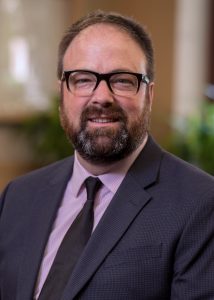Program has added full-time professors and is rising in national rankings
Mitchell Hamline’s Legal Writing program has some special reasons for celebration this fall.
First, it has the most full-time professors—10—it has ever had. That means more individual attention for students in the two required first-year legal writing courses, and more capacity for the faculty members to do research and service to the field.
Second, the program cracked the top 40 this spring in the U.S. News & World Report rankings. It has jumped 88 spots in the last three years and is sitting at a tie for 39th. Director Tom Cobb calls the ratings bump “wonderful; it’s an honor to be recognized for all our team’s hard work.”
Before the 2015 combination that brought the two schools together, Hamline Law had staffed its legal writing program with full-time faculty—as do nearly all of the nation’s 186 programs—but William Mitchell relied more on adjunct faculty. Mitchell’s model persisted for the first few years after the schools joined, but the goal was to switch to a full-time faculty model, which offers not only increased student support but academic expertise and engagement in the field of legal writing. The model still uses some adjuncts, who bring valuable real-world experience and perspective, but a lot fewer.

Professor Tom Cobb is director of Mitchell Hamline’s legal writing program.
As they built the legal writing program for the combined school, Mitchell Hamline faculty were “working with rich soil,” Cobb said. They were able to draw on “powerhouse programs” that existed at both legacy schools, developed at Mitchell by Christina Kunz and Deborah Schmedemann and led at Hamline by Mary Trevor. Dean Raths provided outstanding leadership for the program after the schools combined, Cobb said, supported by dynamic professors including Steve Aggergaard and Lisa Needham. President and Dean Anthony Niedwiecki, who took over in 2020, is a recognized legal writing scholar and was supportive of long-term change at the school.
The next big step, Cobb said, was “hiring amazingly talented and well-known core faculty who have great reputations in the field.” These were drawn from academia but also from a variety of backgrounds including private legal practice, nonprofits, and public service.
Two professors, Wendy Shea from Southern University Law Center and Melissa Shultz from the University of North Texas Dallas College of Law, were hired, as was a practitioner, Hetal Dalal, who co-founded and was in-house counsel for The Center for Popular Democracy. The next year, 2021, a prominent scholar in the field, David Cleveland, came to Mitchell Hamline to serve for a year as the school’s first Distinguished Professor and Scholar.
The team was strengthened by longtime instructors Peggy Kline Kirkpatrick and Erica Strohl and by visiting assistant professors Maikieta Brantley and DeShayla Strachan. The Visiting Assistant Professor program was designed to recruit accomplished attorneys of color into teaching positions for 2-3 years and then launch them into permanent teaching spots in the legal academy. The first hires were designated to support legal writing.
This spring, the school announced the hiring of an additional tenure-track faculty member, Jared Mollenkof, to teach in legal writing. Mollenkof served as an assistant public defender with the Hennepin County Public Defender’s Office from 2019-2022. And a new visiting assistant professor, Octavia Carson, who founded a nonprofit to assist Black bar applicants with bar exam expenses, joined the team in July as well.
Having a cadre of full-time professors teaching in the program has several advantages. “Students get more personal attention,” said Shea, who is the program’s assistant director. “This program really revolves around lots of one-to-one support.”
And the faculty have more capacity to contribute to the field in broader ways, said Cobb. He cited Dalal and Kirkpatrick’s recent work at the Minnesota Court of Appeals and Shultz’s recent paper on the changing bar exam that has positioned her as a leading voice on the topic. “When you have 10 teachers who are invested, you can really make a lot more impact.”
And the experienced faculty are making it possible for Mitchell Hamline to train the next generation of legal writing teachers. “Our visiting assistant professors are strong teachers and up-and-coming leaders in the field,” Cobb said. “I feel really proud of helping to create an environment where they can thrive.”
